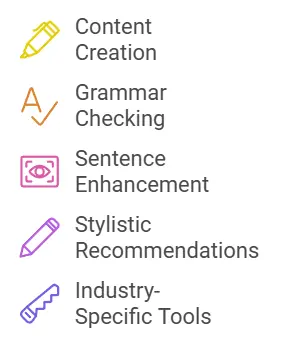Artificial intelligence (AI) is early on changing the world in multiple sectors, and writing is no different. AI writing assistants have become essential tools for professionals, students, and creatives alike, with a game-changing level of efficiency, creativity, and accuracy in the written word.

These tools are changing how we write, whether you need to draft an email or a longer-form article.
What is an AI Writing Assistant?
An AI writing assistant is a software application based on machine learning and natural language processing (NLP) algorithms that help users with their writing tasks. These supports can do a lot, including content creation, grammar and spelling checking, sentence enhancement (i.e., changing or tweaking the message’s coherence), and recommending stylistic changes. At the same time, other systems can now create complete, full-blown essays, marketing copy, or scripts from little more than a prompt.
Now, some platforms are dedicated to unique industries, such as affiliate marketing and content-driven businesses, mixing AI with clarity on the audience’s needs. These tools are becoming the trend as they allow a seamless generation of hyper-targeted, high-performing content and show the ongoing way for specialized AI solutions.
Key Features of AI Writing Assistants
- Content Generation: From helping you generate ideas to drafting outlines or even entire articles, AI writing assistants can do it all. Business owners and marketers seek tools to generate engaging blog posts or product reviews in minutes.
- Grammar and Style Checks: The most popular AI tools deal with finding grammatical errors, typos, and stylistic inconsistencies to produce polished and professional content.
- Tone Analysis: Most AI systems will modify the tone of a piece to be more professional, conversational, or persuasive, depending on the ideal audience.
- SEO Optimization: Some platforms are excellent when writing content to be optimized for search engines. Marketers can leverage AI to create keyword-density encrypted product reviews or blog posts following a structure and formatting of our choice such that it gets ranked high on Google and Bing Search Engines.
- Audience Targeting: Niche-stuffing is what premium writing tools automate, especially for e-commerce and affiliate writing, where audience relevance can be the difference between winning or hitting the road.
Benefits of AI Writing Assistants
- Efficiency and Speed: For industries that rely heavily on content, AI tools’ ability to reduce drafting, editing, and finalizing deadlines from days to minutes is revolutionary.
- Cost-Effectiveness: Using an AI writing assistant can save money compared to hiring a human writer, capable of tackling recurring tasks such as product descriptions or landing pages.
- Enhanced Creativity: These tools can help combat writer’s block by providing new ideas, outlines, or a different approach to writing about a specific topic.
- Customization: Several AI platforms permit users to refine their outputs so that the resulting content reflects brand voice or target audience expectations.
- Better Conversion Rates: Optimized Affiliate Marketing and Product Review tools help businesses create high-converting content. Platforms tailored to these needs can quickly produce persuasive and reader-friendly content.
Industries That Benefit from AI Writing Assistants
- Affiliate Marketing: Affiliate marketers use persuasive, SEO-friendly content to motivate readers to buy. AI tools designed specifically for affiliate marketers create high-ranking product reviews and comparisons that convert.
- E-commerce: AI writing tools can help you write attractive, detailed product descriptions, FAQs, and marketing materials for your online shop.
- Content Marketing: For agencies and businesses looking to scale their content strategies, AI helps them publish blog posts, email campaigns, and ad copy faster and with quality.
- Education and Academia: 1.) AI allows students and researchers to analyze paper writing and even citation formats for academic books.
- Small Businesses: Small businesses have limited resources to hire a marketing team; with the help of AI writing assistants, they can create pro-level content — from website copy to social media posts.
How AI Tools are Evolving
The AI writing space continues to evolve to meet industries’ growing and diverse needs. Today’s tools are designed for narrower use cases, such as targeting audiences or optimizing conversions. Such trends hint at the emergence of particular and niche AI offerings that target discrete problems for users, like connecting them with affiliate content creators to fill websites or stronger customer engagement in e-commerce.

In addition, most platforms now offer data-driven insights into how users could optimize their strategies. These tools use data analysis to identify trends in the content that performs well and provide actionable recommendations for improving future creations.
Top AI Writing Assistants
Designed with affiliate marketers in mind, AffPilot enables you to write high-converting, SEO-optimized product reviews and comparison articles. Save effort and time and solve how to scale affiliate marketing and content strategies—all in one, easy-to-use format that adapts outputs to your tone of voice!
Grammarly is excellent for text editing, offering grammar check, spell check, tone analysis, and plagiarism detection capabilities, but it needs advanced content writing features.
Jasper — multi-purpose creative content tool, templates (only improved for general use, NOT improved specifically to affiliate), brain dump (for idea/section generation), SEO writing.
Writesonic: Writesonic is more focused on marketing copy and blog posts but still offers multilingual support for tools to create text for ads and landing pages. It works fine for general content but only a little for affiliate marketing.
Additional AI Tools You Might Like: Grammarly, ProWritingAid, Quillbot, Scribbr, Paperpile, ZoteroBib Essaybot
Choosing the Right AI Writing Assistant
You chose an AI writing assistant based on your end goal(s). Each tool has strengths, from grammar and style to SEO and audience targeting. Affiliate marketers or digital content creators will want a platform that produces quality while keeping the right alignment with conversion.
Look for features such as:
- SEO Aspect: To make sure your content ranks
- Capabilities Specific to a Niche: e.g., product review or ad copy-only tools
- Ease Of Use: An easy-to-use interface will save time and effort and boost productivity.
- Scalability: Identify a platform that supports higher volume generation for bulk content.
Ethical Implications and Challenges
While there are compelling benefits to using AI writing assistants, they also present challenges:
- Plagiarism and Originality: Readers must check if the AI-generated content is original and properly cited.
- Dependency: Over-dependence on AI can hamper the evolution of individual writing capabilities.
- Bias: AI systems trained on biased datasets could generate content incorporating those biases, even unintentionally.
- Human Oversight: Though AI has the potential to simplify writing jobs, it lacks human intervention and, thus, requires someone to adjust the words according to needs.
The Future of AI Writing Assistants
The future of AI writing assistants looks even brighter with the rise of AI technology over the next decade. These tools will improve their understanding of nuanced context and help them become more capable of detecting subtler aspects such as tone, style, and audience. AI writing assistants can create personal and relatable content, effectively closing the distance between human creativity and machine efficiency.

From voice-to-text to augmented reality (AR), new technologies are about to blend perfectly with AI writing tools. The vision: a writer speaks their ideas into an AR interface, and an AI polishes the text as it appears on screen. Such integrations will fundamentally enhance writing, making it interactive and dynamic — a boon for the education, gaming, and creative writing sectors.
More emotional intelligence for AI writing assistants. This will allow them to generate comments with a far more relatable quality, infused with empathy and emotional cues that are custom-made to target audiences. These enhancements could alter customer support dialog flows, marketing messaging, and creative narratives.
The move towards niche applications will be further exacerbated as we see the advent of specialist AI tools for affiliate marketing, legal documents, technical writing, and more. For example, the tools designed for affiliate marketers will create search-engine-optimized content, market analysis, and audience behavior to provide hyper-targeted outputs. Concentrating on specialized solutions will allow businesses to gain a higher ROI with the least number of effort.
Finally, an AI tool will likely provide real-time collaborative features that enable multiple users to work on a single document while receiving AI-inspired recommendations in real-time. Such collaborative environments will boost creativity and smooth workflows, especially for teams working on projects in rapidly changing markets.
With changing ethical scenarios and regulatory frameworks, we will also be looking to move toward a more transparent and able AI system. Building bias-free tools to help people create original content — or support in terms of graphics and code — will always have better trust and acceptance from the user side so that developers will focus a lot.
When they gel together, they won’t be mere tools but virtual partners in copywriting and beyond, giving birth to a new age of content creation.
Conclusion
AI writing assistants have made the creative-efficiency overlap essential to multiple industries with high demands for great content and a rapid pace of production. Despite advancements in machine learning and natural language processing technology, these tools provide specialists and businesses with the most excellent maximum-time support today.
For some businesses, such as affiliate marketing businesses or digital content creation, everything revolves around writing, so it makes sense to adopt AI writing assistants. These platforms not only accelerate the actual work but also improve the quality of the output content so that you can grow your audience and achieve your larger objective (or anything in between).




